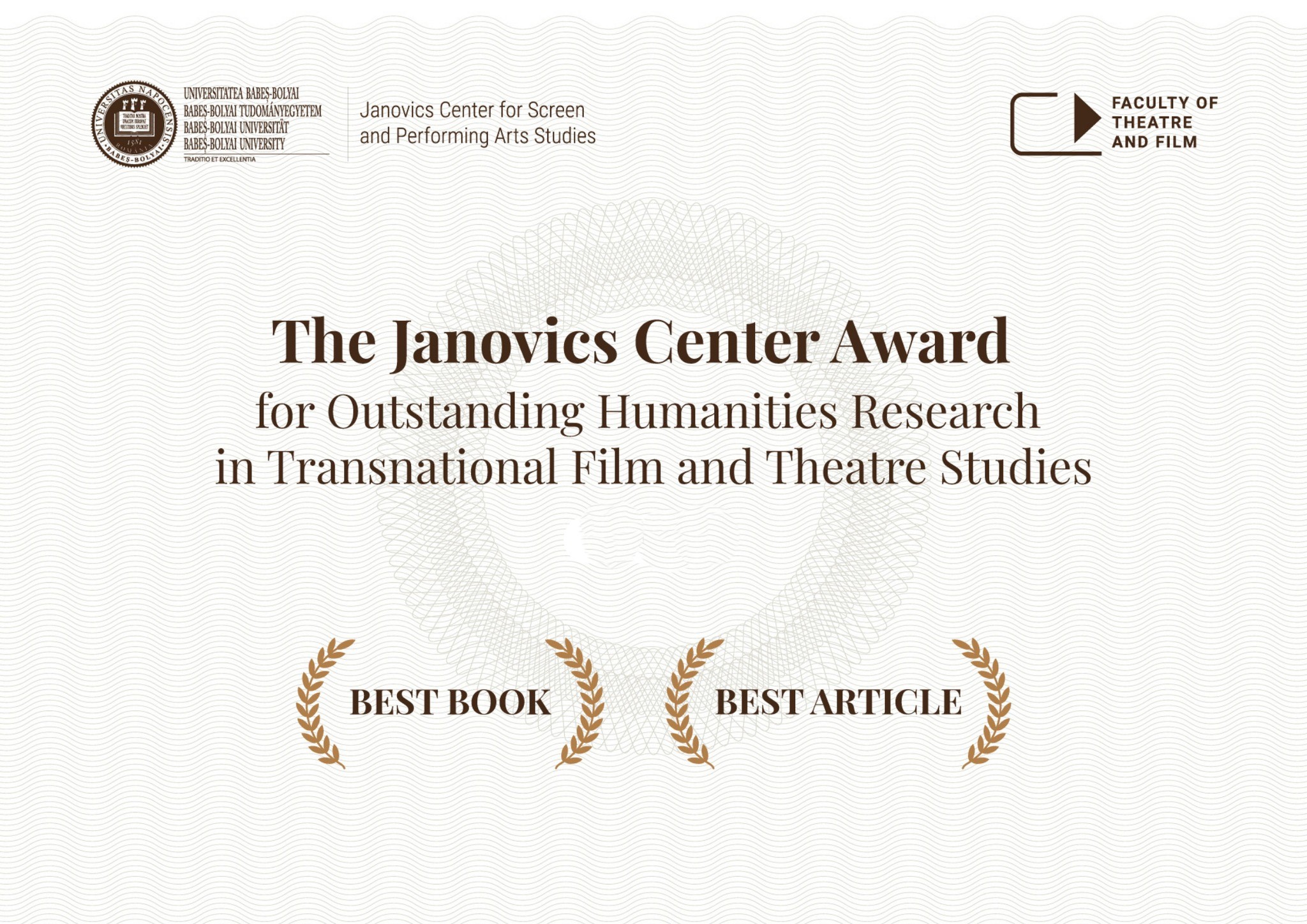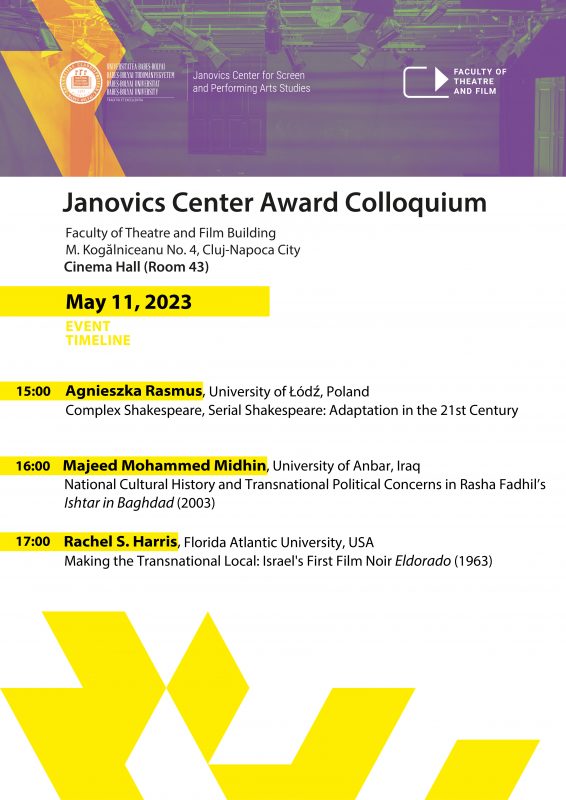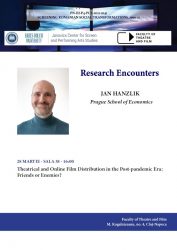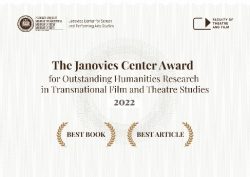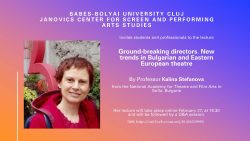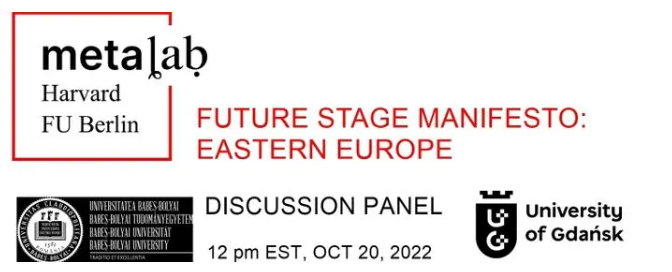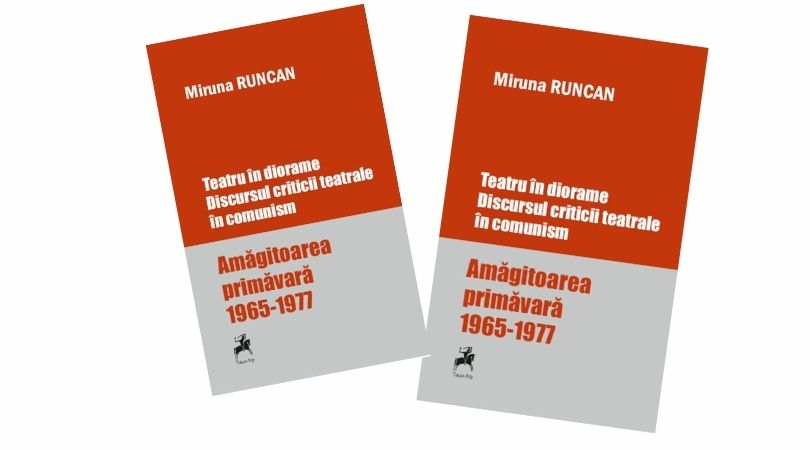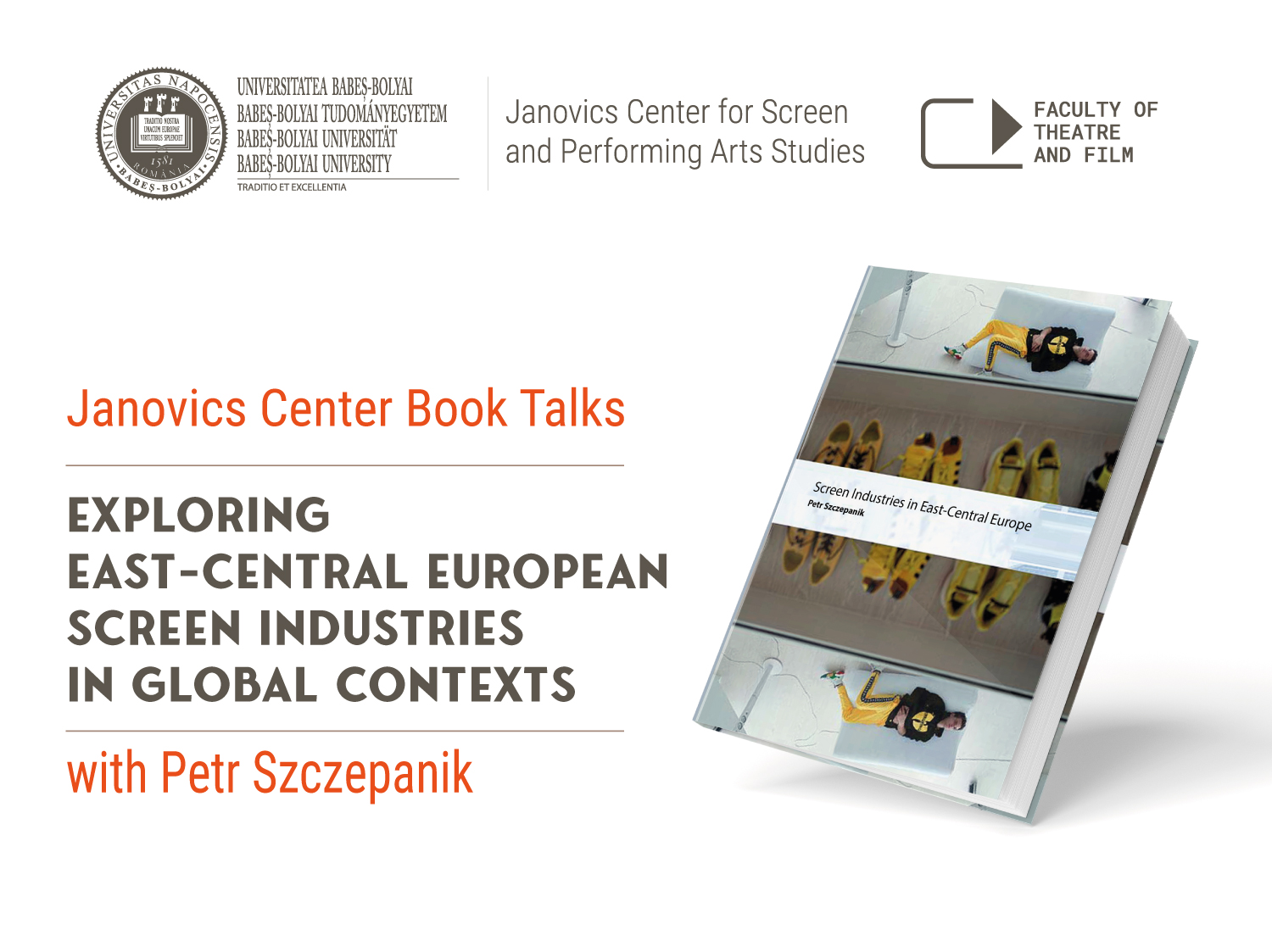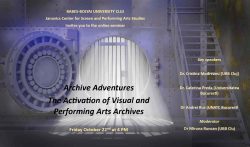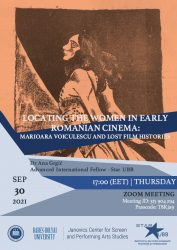
Janovics Center for Screen and Performing Arts Studies
Janovics Center for Screen and Performing Arts Studies is affiliated with the Faculty of Theater and Film at Babeș-Bolyai University. It aims to advance interdisciplinary research in the fields of performing and screen arts: theatre, performing arts, film, television and media. The center is dedicated to researching the dialogue of these arts with contemporary society. It supports projects that study reception in theatre and film; cultural consumption in the context of digitalization; theatre, film, television and digital media iconography; the relationship of film, television and theater with new media; digital distribution; and theatre and visual anthropology. It also supports projects that approach the institutional system in culture, legislation on the operation and financing of entertainment and film institutions, and sustainable cultural management in the field.
The Janovics Center for Screen and Performing Arts Studies takes over and continues, at a superior level of quality, the activity of the “Vlad Mugur” Center for Research and Creation in Theater, Film and Media, started in 2007. CCCTFM Vlad Mugur has so far hosted several working groups on history, theory, and praxis in the fields of theater, film, and media, has developed impactful research, has consistently organized high-visibility international conferences, published collective and individual volumes hosted by prestigious publishing houses in the country and abroad, and has also edited the biannual scholarly journal Studia UBB Dramatica. The restructuring and renaming comes to respond to the members’ desire to give their research a wider international resonance, emphasizing both its interdisciplinary and multicultural character.
The center takes the name of an actor, film and theatre director from Cluj. Jenő Janovics was a pioneer of film production in the region, making his first film, The Yellow Foal, in 1913 and then starting the first local film studios, Corvina (1915) and Transsylvania Film (1917).
Leadership: The Center is headed by Miruna Runcan (Professor of Theatre Studies) and Constantin Parvulescu (Associate Professor of Film and Media studies).
Founding Members
Horea Avram — Associate Professor of Film and Media Studies
Anna Batori — Associate Professor of Film and Media Studies
Ana Grgic — Associate Professor of Film and Media Studies
Anca Hațiegan — Associate Professor of Theatre Studies
Liviu Malița — Professor of Theatre Studies
Cristina Modreanu — Researcher in Theatre Studies
Laura Pavel — Professor of Theatre Studies
Andrea Tompa — Associate Professor of Theatre Studies
Claudiu Turcuș — Associate Professor of Film and Media Studies

Klaus Obermaier and Ars Electronica Futurelab, „Apparition” (2004-2013)
Leadership
Miruna Runcan — Professor of Theatre Studies
Constantin Parvulescu — Associate Professor of Film and Media Studies
Members
Horea Avram — Associate Professor of Film and Media Studies
Boglárka Farkas— PhD. Candidate in Film and Media Studies
Ana Grgic — Associate Professor of Film and Media Studies
Anca Hațiegan — Associate Professor of Theatre Studies
Liviu Malița — Professor of Theatre Studies
Cristina Modreanu — Researcher in Theatre Studies
Laura Pavel — Professor of Theatre Studies
Andrea Tompa — Associate Professor of Theatre Studies
Lucian Țion — Senior Lecturer in Film and Media Studies
Claudiu Turcuș — Associate Professor of Film and Media Studies
Andrea Virginás — Associate Professor of Film and Media Studies
Ilinca Todoruț — Assistant Professor in Theatre Studies
Research Grants
Dicționarul Multimedia al Teatrului Românesc
DMTR are ca scop redescoperirea, revitalizarea și reimaginarea arhivelor teatrale pentru noile generații și să contribuie la prezervarea lor. O echipă de specialiști în artele spectacolului, alături de studenți scotocesc prin arhive teatrale private și contribuie la digitalizarea unor arhive existente în teatrele de stat, recuperând documente nedigitalizate până acum și punându-le în circuit pentru accesul larg, gratuit. DMTR, www.dmtr.ro, are până acum 100 de fișe multimedia, împărțite în cele două secțiuni, Artiști și Spectacole, iar în 2022 va fi completat cu încă 50 de fișe despre Spectacole și Artiști din perioada de după 1989. Proiectul a fost inițiat de criticul de teatru Cristina Modreanu și produs de Asociația Română pentru Promovarea Artelor Spectacolului în parteneriat cu UBB prin Facultatea de Teatru și Film împreună cu UAT Târgu Mureș. Printre colaboratorii cei mai activi ai DMTR se numără prof. dr. Miruna Runcan și conf. univ. dr. Anca Hațiegan și Cristina Modreanu care, în octombrie 2021, s-a alăturat Facultății de Teatru și Film în calitate de cercetătoare. Toate trei sunt membre ale Janovics Center for Screen and Performing Arts Studies
- Hațiegan, Anca. “The Avant-garde and Independence: The Case of Romania.” In A Lexicon of the Central-Eastern European Interwar Theatre Avant-garde, edited by Dariusz Kosiński, 53-62. Warsaw and Aberystwyth: Instytut Teatralny im. Zbigniewa Raszewskiego and Performance Research Books, 2023. ISBN 978-83-67682-17-6.
- Hațiegan, Anca. “The December 1989 Revolution in Post-Communist Romanian Drama.” In Language of the Revolution: The Discourse of Anti-Communist Movements in the “Eastern Bloc” Countries: Case Studies, edited by Eugen Wohl and Elena Păcurar, 265-288. London: Palgrave Macmillan, 2023.
- Hațiegan, Anca. “Theatre of the Nation: Romanian Historical and Allegorical Drama Before the First World War.” Trimarium: The History and Literature of Central and Eastern European Countries, 1, no. 1 (2023): 312-331. https://doi.org/10.55159/tri.2023.0101.13.
- Modreanu, Cristina. “Crossdressing as Resistance in Communist Romania: The Case of Miluță Gheorghiu.” European Journal of Theatre and Performance, 6 (2023): 344-359.
- Modreanu, Cristina. “Gianina Cărbunariu, Director-Playwright.” In The Routledge Companion to Contemporary European Theatre and Performance, edited by Aneta Mancewicz and Ralf Remshardt, 531-536. Abingdon – New York: Routledge, 2023.
- Modreanu, Cristina. “If you had only spoken…Counter-narratives and Marginalized Histories of Women on the German Stage in Romania, before and after 1989.” Critical Stages (IATC webjournal), 27 (2023).
- Pavel, Laura et. al. Dicționarul cronologic al romanului românesc de la origini până în 2000, vol. I-II. Rev. ed. Cluj-Napoca: Presa Universitară Clujeană, 2023. ISBN 978-606-37-1905-9, (vol. I) 978-606-37-1906-6, (vol. II).
- Pavel, Laura, Deliu, Ana-Maria and Paul Mihai Paraschiv. “What is Post-Criticism? Reconstructive Interpretive Strategies.” Metacritic Journal for Comparative Studies and Theory, 9.2 (2023): 4-8. https://doi.org/10.24193/mjcst.2023.16.01.
- Todorut, Ilinca. “How to Lose a Guy in Ten Wars.” Introduction to Opheliamachine by Magda Romanska, 1-8. London: Bloomsbury, 2024.
- Todorut, Ilinca. “Lockdown Theatres of Sadness: Case studies of precarity in artistic work.” Performance Research 28, no.5 (2024): 105-113.
- Todorut, Ilinca. “Mobilizing Workers Poetry: A Pedagogical Journal.” TDR: The Drama Review 68, no. 1 (2024): 170–84. https://doi.org/10.1017/S1054204323000539.
- Virginás, Andrea. “Media Borders in a Post-Media Age: The Historical and Conceptual Co-evolution of Cinema, Television, Video, and Computer Screens.” In The Palgrave Handbook of Intermediality, edited by Jørgen Bruhn, Asun López-Varela Azcárate, Miriam de Paiva Vieira, 979-998. London: Palgrave Macmillan, 2023.
- Virginás, Andrea. “Mediated Remembering of Having Been Traumatized Collectively in Recent Hungarian Historical Films: Transmediating Analogue Photography in Post Mortem (2020) and Natural Light (2021).” Ekphrasis. Images, Cinema, Theory, Media, 29, no. 1 (2023): 25-46.
- Constantin, Parvulescu, ”The critical Innovation Discourse of Small VODs: The Case of The Death of Mr. Lăzărescu on Cinepub. Images vol. XXXII, no. 41. Poznan 2022. Adam Mickiewicz University Press
- Laura Pavel, Ionesco. Antilumea unui sceptic, ediţie revăzută şi adăugită, Cluj, Ed. Şcoala Ardeleană, 2022.
- Modreanu, Cristina. Teatrul ca rezistență. Oameni de treatru în arhivele Securității. Polirom 2022.
- Parvulescu, Constantin., & Copilaș, E. (2022). Bottom-up Content Convergence Phenomena in Socialist Cultural Economies: The Case of Premodern Story Universes of Romanian Film and Music. East European Politics and Societies.
- Parvulescu, Constantin. “Romanian Film for the World: the Cultural Embedding of an Independent vod”, Studies in World Cinema 2, 1-2 (2022): 142-160, doi:
- Parvulescu, Constantin. “Finance Film on Must-See Lists: A Tale of Positivization.” Acta Universitatis Sapientiae, Film and Media Studies 21, no. 1: 184-199.
- Țion, Lucian. 2022. “The Relationship of History to the Present: Romanian Nationalism in the Films of Radu Jude.” Cinéaste 47, no. 4 (September): 30-34.
- Tion, Lucian. 2022. ”The Socialist Leader in Film: Sergiu Nicolaescu’s Hot Days in Romania and Post-Maoist China.” Comparative Literature Studies (Urbana) 59, no. 3 (August): 468-486.
- Anca Hațiegan. „Nacionalista kiszorítósdi: Francesca Rozan esete (Nationality in Art: The Case of Francesca Rozan).” Szinhaz.net. No. 22, March (2022): 20-24.
- Ana Grgić, Early Cinema, Modernity and Visual Culture: The Imaginary of the Balkans. Amsterdam: Amsterdam University Press, 2021.
- Constantin Parvulescu and Jan Hanzlik. “The Peripheralization of East-Central European Film Cultures on VOD Platforms.” Iluminace. Vol. 33, Iss. 2, (2021): 5-25.
- Horea Avram, Perspectiva negociabilă. Eseuri și comentarii despre practici artistice actuale. [Negotiable perspective. Essays and Comments on Contemporary Artistic Practices]. Bucharest: Eikon Press, 2021.
- Ana Grgić, La désintégration et la résurrection de l’image-matière : pour une philosophie de la restauration cinématographique, Presa Universitară Clujeană, 2021.
- Laura Pavel, Personaje ale teoriei, fiinţe ale ficţiunii (Personae of Theory, Beings of Fiction), Iaşi: Institutul European, 2021.
- Miruna Runcan, Teatru în diorame. Discursul criticii de teatru în comunism. Viscolul 1978-1989, (Theatre Criticism Discourses in Communist Era – 1987-1989), București, Editura Tracus Arte, 2021.
- Ana Grgić, “Dialogical kinesis: Edison and the “print” appearance of Blacksmiths in the Balkans”, Early Popular Visual Culture, May, 2021. DOI: 10.1080/17460654.2021.1914702
- Constantin Parvulescu, “The Political and Economic Intervention of Non-Fiction Money Literacy Film in the Post-2008 Era,” Canadian Journal of Film Studies,
- (2021) 30:1, 49-71 DOI: 10.3138/cjfs-2020-0034
- Constantin Parvulescu & Claudiu Turcuș, “Afterlives of Romanian socialist-era historical film: reruns, story universes, reception,” Canadian Slavonic Papers, (2021) 63:1-2, 50-71, DOI: 10.1080/00085006.2021.1915527
- Cristina Modreanu, “National Identity as inflammable material (Identitatea Națională ca material explozobil)”, Scena.ro online
- https://revistascena.ro/category/editorial/
∇ CALL FOR SUBMISSIONS (INFOPACK HERE)
2023 Award Winners Announcement
The Janovics Center Award for Outstanding Humanities Research in Transnational Film and Theatre Studies is yearly awarded to publications that advance transnational research in the fields of film and theatre studies and employ innovative methods in the humanities. The Juries awarding these works were composed of Professors Agnieszka Rasmus from the University of Lodz, Professor Francesco Pitassio from the University of Udine, and Constantin Parvulescu, director of the Janovics Center (for film studies); and Professor Andriej Moskwin from the University of Warsaw, Professor Ileana Marin from the University of Wasington, and Miruna Runcan, director of the Janovics Center (for theatre studies). The Juries decided to offer the following awards:
BEST BOOK of 2023: Exotic Cinema: Encounters with Cultural Difference in Contemporary Transnational Film by Daniela Berghahn, Edinburgh University Press, 2023.
The Jury commends the monograph as an outstanding example of transnational film studies research, which analyzes many films from various continents and regions of the globe. Berghahn’s meticulous scholarship, comprehensive writing, and well-constructed argument are praised for decentering concepts such as the exotic and exoticism, inviting readers to rethink them. The book moves away from the received wisdom of exoticism, too often coupled with orientalism and colonial power, and offers an original and insightful look at what the notion means today. With a profound understanding of the literature in her field, Berghahn offers a courageous critical reassessment of the aesthetic strategies and cultural value of exoticism against competing concepts describing cross-cultural encounters, such as orientalism, colonialism, primitivism, imperialism, and cultural appropriation. Her case studies are meticulously discussed and offer a multifaceted picture not just of individual films but also of their production context and reception.
BEST ARTICLE of 2023: “The Domestic Kitchen as Performance Space: The Female Artist vs the Housewife” by Athena Stourna, published in Critical Stages (2023).
The Jury considered that the article offers a complex perspective on the evolution of a cultural/ theatrical phenomenon, also addressing relevant issues concerning women’s artistic formulas of rethinking the cultural heritage by means of original and powerful – provocative and friendly at the same time – pieces of theatrical performance dedicated to a contemporary audience. The Jury appreciated Stourna’s profound analysis of the social, cultural, and political (both national and international) context of theatre productions, and the complex depiction of the impact of their aesthetic achievement.
The Jury also decided to offer a SPECIAL MENTION to the monograph A Critical History of Health Films in Central and Eastern Europe and Beyond by Victoria Shmidt and Karl Kaser. Routledge, 2023.
The Jury commends the novelty of the topic of the monograph and the relevance of the way in which it analyzes its primary material. Shmidt and Kaser’s effort originally approaches propaganda films about health from East-Central Europe as relevant contributions to understanding important transformations in global conceptions of governmentality. The monograph effectively addresses a substantial gap in the field and shifts away from usual bodies of work focused on Western countries’ institutions and film productions. By combining a wide range of methodologies, film analysis, the history of medicine, cultural anthropology, and political theory, it is exceptionally interdisciplinary. By looking at different actors involved in making health films, it shows complicated entanglements between the local and the global. This approach enriches our knowledge of the role cinema played in contributing to and exerting biopower, while giving full account of previously neglected areas. The case studies reveal early cinematic tools of “othering,” especially along the gender, class, and race spectrum.
The Janovics Center congratulates the authors and will organize book presentations and talks related to their work. Further details on the award and related events will be available on the Center’s website, under News and Events and on social media.
Cluj-Napoca, March 20, 2023. Constantin Parvulescu and Miruna Runcan
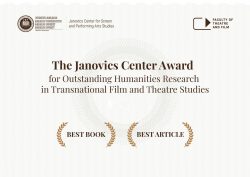
BEST BOOK of 2022: Hollywood Remakes of Iconic British Films: Class, Gender and Stardom (Edinburgh University Press, 2022) by Agnieszka Rasmus, University of Łódź, Poland.
The Jury regards the monograph as an excellent example of transnational film studies research. It commends its detailed scholarship, quality of writing, and carefully thought-out argument. One of the strengths of Rasmus’s monograph is the novelty of the topic, an examination of films made with substantial Hollywood involvement in the UK in the 1960s/1970s, and then remade as Hollywood films in the 2000s, thereby addressing important issues about transnational production and distribution, cross-cultural exchange and reception, and the processes of adaptation and remaking. Drawing on an in-depth knowledge of the literature in her field, Rasmus’s approach is multidimensional, engaging with both industrial and aesthetic concerns, employing horizontal and diachronic research, and providing a comprehensive cultural and historical context. This enables her to reveal the way class, gender and stardom are adapted and updated for global audiences.
BEST ARTICLE of 2022: National cultural history and transnational political concerns in Rasha Fadhil’s ‘Ishtar in Baghdad’, Studies in Theatre and Performance, Routledge, by Majeed Mohammed Midhin & David Clare
The Jury considered that the article offers a fresh perspective on a cultural/theatrical space, also addressing relevant issues concerning the formulas of rethinking the cultural heritage for an original and powerful piece of theatrical performance, dedicated to a contemporary audience – Rasha Fadhil’s Ishtar in Baghdad (2003). The jury appreciated the authors’ profound analysis of the social, cultural, and political (both national and international) context of Iraqi theatre production, and the complex depiction of the impact of aesthetic achievement.
The Janovics Center congratulates the authors and will organize book presentations and talks related to their work. Further details on the award and related events will be available on the Center’s website, under News and Events.
Cluj-Napoca, March 15, 2023.
Constantin Parvulescu and Miruna Runcan
EVENTS: Second online international networking symposium “Women’s Global Film Movements and Networks”, 5-7 January 2023 The second online international networking symposium organised by the Women’s Film Heritage project takes place 5-7 January 2023, with a focus on Women’s Global Film Movements and Networks. This 3-day symposium is organised by Janovics Centre for Screen and Performing Arts Studies, Faculty of Theatre and Film, Babeș-Bolyai University (Romania) in collaboration with Queen Margaret University and is funded by the Royal Society of Edinburgh. It brings together a wonderful group of international speakers whose research investigates the absences and presences of women’s work in our shared global film heritage.The event is free to attend, only registration is required.
Please see the eventbrite link for the event (for registration): https://www.eventbrite.co.uk/e/womens-global-film-movements-and-networks-tickets-492851049757
In October 2021, the futureStage research group published the Future Stage Manifesto, which has been translated and published in twelve languages, including Polish, Romanian, Hungarian, and Russian. This panel of international researchers and translators will discuss the impact of the Future Stage Manifesto on the Eastern European performing arts scene, and the opportunities it opens for transcultural collaborations, access, and political engagement. The panel will be moderated by metaLAB principal, Magda Romanska.
To participate, register here.
This event is co-organized with the Department of Performing Arts Studies at the University of Gdańsk in Poland, and Janovics Center for Screen and Performing Arts @ Babes-Bolyai University in Romania.
SCREENING SOCIAL TRANSFORMATIONS
A research colloquium
10.00 – 11.00
Alasdair King, Queen Mary University of London
Film and political economy
11.00-12.00
Bogdan Popa, Transylvania University of Brașov
Sexuality and social criticism in Romanian film
15.00-16.00
Emanuel Copliaș, West University of Timișoara
A Hegelian approach to Romanian postcommunism
16.00-17.00 (online)
Laszlo Strausz and Balazs Varga, ELTE Budapest
Big data, small cinema: introducing a database-driven research on the social history of Hungarian cinema
EVENT – Feminist Film Heritage: Expanding the World’s Film Archives Call for Papers: Second Global Networking Symposium 5-7 Jan 2023
THEME: “Women’s Global Film Movements and Networks”
We warmly invite proposals from international scholars and practitioners with a specialism in the history of global cinema, for a second networking event in the context of the Feminist Film Heritage project, funded by the Royal Society of Edinburgh in Scotland. With the project we aim to map out and rediscover the neglected cultural histories of women’s work in early cinema. For this second event, we wish to focus on the histories, infrastructures and practices of women’s networks and movements around the world, which supported women creatives in multiple ways and contributed to the visibility and sustainability of their work and films. We particularly want to invite those with an interest in transnational women’s networks and movements connected to audiovisual practices, such as but not limited to: suffragette movements, the non-aligned movement, socialist and activist networks, film clubs, worker’s unions, various women’s associations and organisations, and film festival networks, which supported women creatives in film through networking opportunities, mentorship, career programmes, funding, formal and informal film collaborations, etc.
The two-year project, Feminist Film Heritage: Expanding the World’s Film Archives, aims to establish an international network of scholars working on decentring film history, and to do so by countering feminist film history’s continued neglect of filmmakers from outside Europe and the US. Hoping to give shape to fuller configurations of the internationalist feminist film movement, we highlight historically transnational networks and reactivate past alliances. With this project we want to make more visible the role of women and their films in the global film archives, establishing a collective of feminist world cinema historians. Bringing together disparate efforts to safeguard individual corpuses of film cultures and heritage, the researchers in this network envisage increased collaboration across borders. Better awareness of presences, absences, practices and methodologies will enable new collaborations between partners across borders.
This initiative is rooted in a desire to consider the diverse methodologies of decolonizing film history in an activist feminist way. We critique the continued Western European dominance of funding and infrastructure for these efforts (including our own). We address the (neo-)colonial history of archives, museums and festivals; the sense of “service” practiced by these institutions; and the (material and conceptual) ownership of artefacts and restorations. This network emphasises the roles of women filmmakers in history; the contributions of feminist scholars to film historiography; and the women workers shaping the structures on which the archival and preservation institutions are built.
The first event, which took place between 10 and 14 January 2022, organised by QMU in Edinburgh and funded by the Royal Society of Edinburgh, gathered over a hundred film practitioners, film historians, and archivists from around the world in an effort to map out existing work and seek out productive pathways towards collaboration. During the five-day global networking event, we were able to learn about national, family and personal archives and initiatives, and preservation facilities and professionals (such as the Pan-African Film Archive, the Albanian Film Archive, and family archives of black Latin American women’s films), and neglected films and filmmaker collectives from around the world (such as women’s third world cinema movement, and women’s networks and work within film clubs), and we were able to establish the grounds for collaborative networks with one another for further research.
This second collaborative networking event, organised by the Janovics Centre for Screen and Performing Arts Studies at the Faculty of Theatre and Film at Babeș-Bolyai University and funded by the Royal Society of Edinburgh, will take place 5-7 January 2023 in an online format to allow participation from scholars and practitioners around the world. Its principal aim is to continue and deepen discussions initiated at the first event, to welcome new research and forge connections among participants as well as to continue ongoing collaborations, in an effort to safeguard global women’s film heritage and make visible different cultural histories of women’s participation in cinema.
Please email the organiser, Dr Ana Grgic, on ana.grgic@ubblcluj.ro, with your proposal for a short, 10-minute presentation, indicating your interest and specialism and a short bio. Please send a 200-word summary of your research interests and 100-word bio, in order that we may organise presentations, focus groups, and networking sessions. Deadline: Monday 31 October 6pm GMT.
We really look forward to hearing from you!
The FFH Team: Dr Lizelle Bisschoff, Dr Ana Grgic and Dr Stefanie Van de Peer
EVENT – Janovics Center Book Talk: Terence McSweeney Black Panther (2018): A ‘defining moment’ for America or Just a Movie?”
Friday, May 27, 12pm, Zoom link: https://zoom.us/j/96382837488 Meeting ID: 963 8283 7488
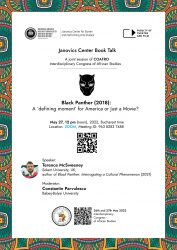
Event – Janovics Center Award Colloquium.
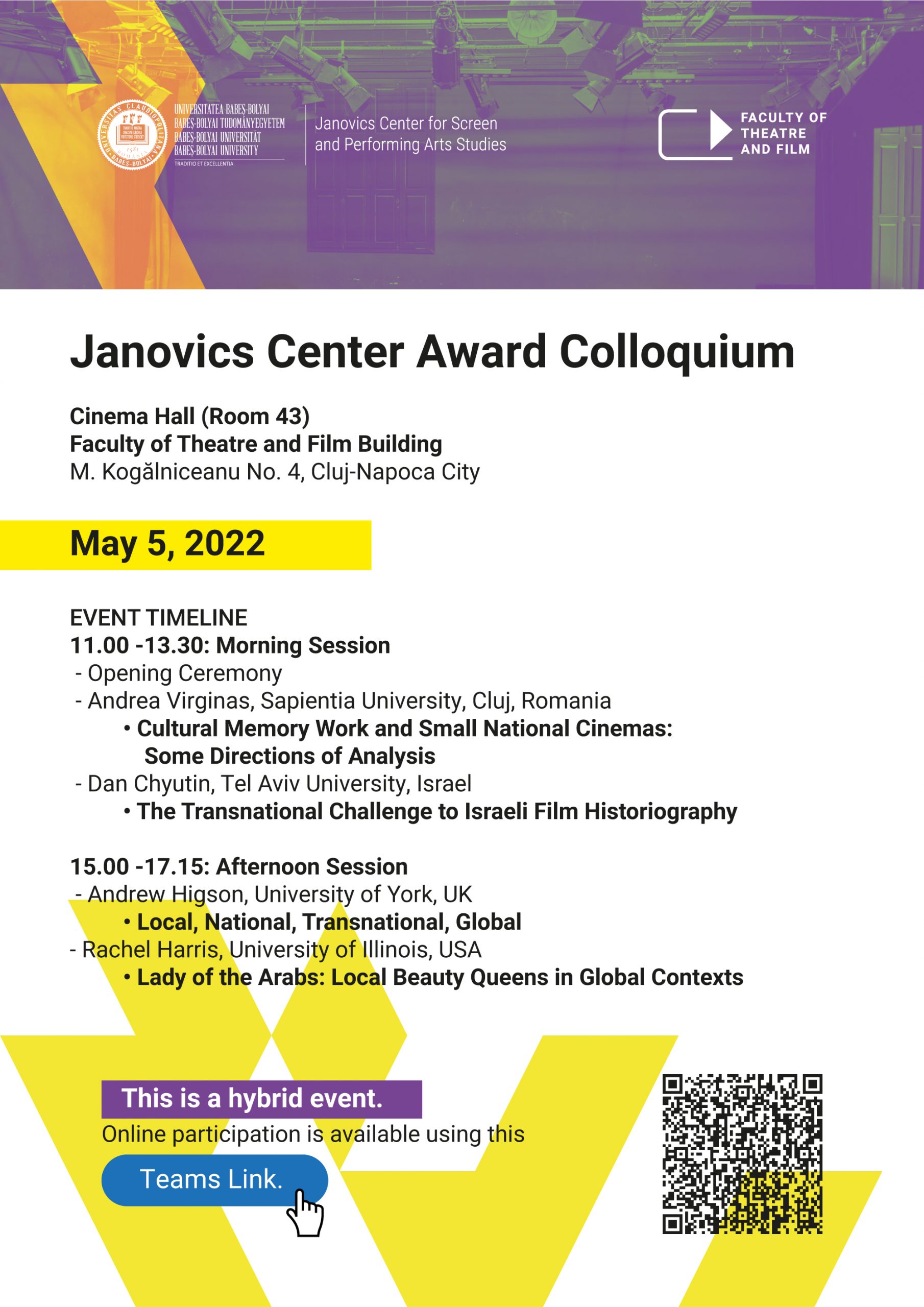
Janovics Center for Screen and Performing Arts Studies, Faculty of Theatre and Film, Babes-Bolyai University is delighted to invite you at the Janovics Center Award Colloquium on May 5, 2022. The event features the winners of The Janovics Center Award for Outstanding Humanities Research in Transnational Film and Theatre Studies.
The event takes place in the Cinema Hall (Room 43) of the Faculty of Theatre and Film Building. Online participation is available using this Teams Link.
Event – Artists and Power in the 21st Century.
Determined by the war in Ukraine, therefore focused on an actual ( ) conflict, The Janovics Center for Screen and Performing Arts Studies invites theatre artists, theatre critics and academics to an online talk on the topic of Artists and Power in the 21st Century.
We have invited in this effect the American theatre critic John Freedman, a former resident of Moscow and an expert in Russian theatre and politics – as proved by his recent article The Anatomy of Lost Love: Russian Culture at War, the starting point of our debate. We have also invited our colleague, professor László Upor, freeSZFE, Budapest – former rector of the Theatre and Film Academy Budapest and a victim of political intervention since a couple of years ago.
The discussion, hosted by Cristina Modreanu, Andrea Tompa and Miruna Runcan, will take place Thursday 27 of April, 19 PM (Athens) /12 AM ET (Estern Time)
Link Zoom
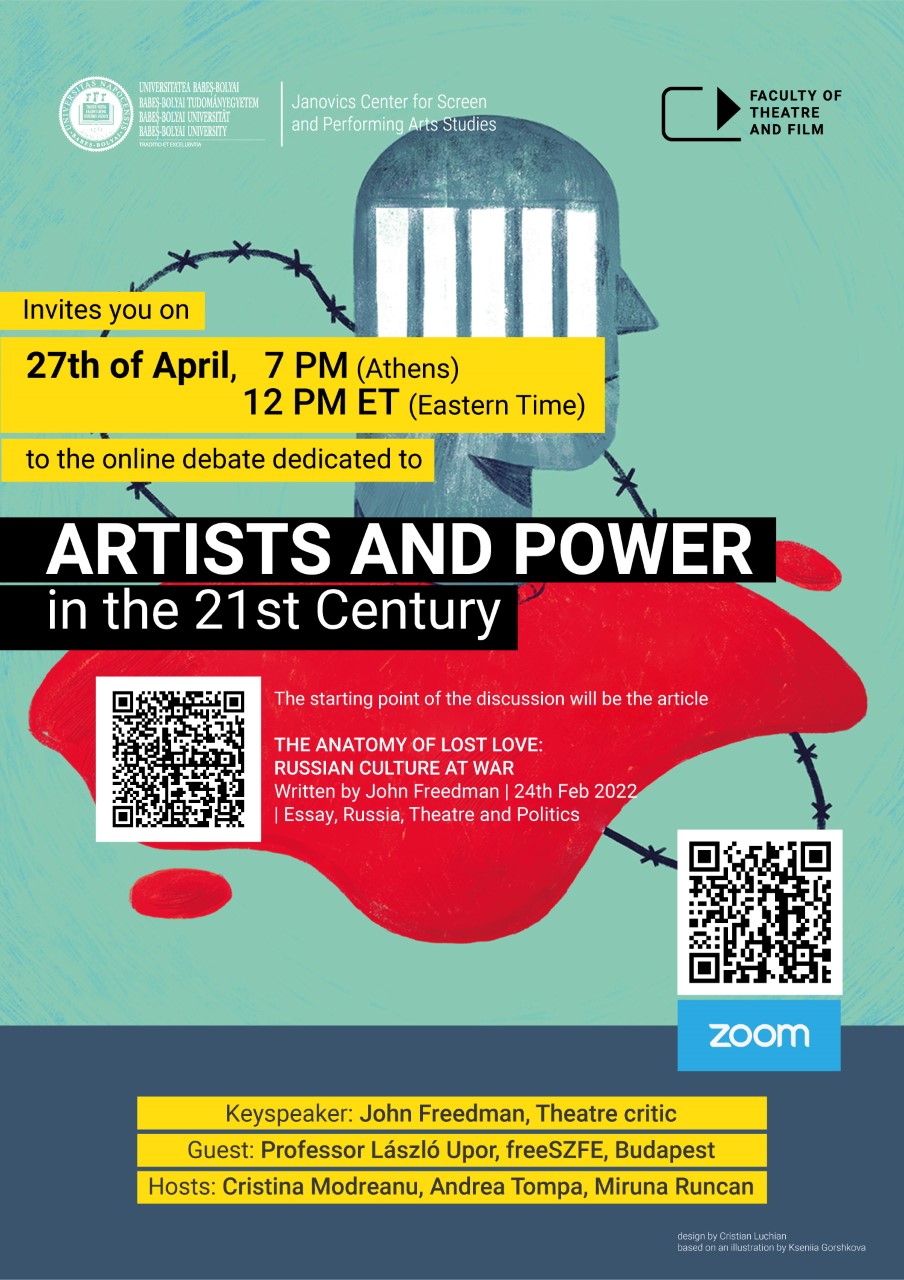
Event – The Janovics Center Award for Outstanding Humanities Research in Transnational Film and Theatre Studies
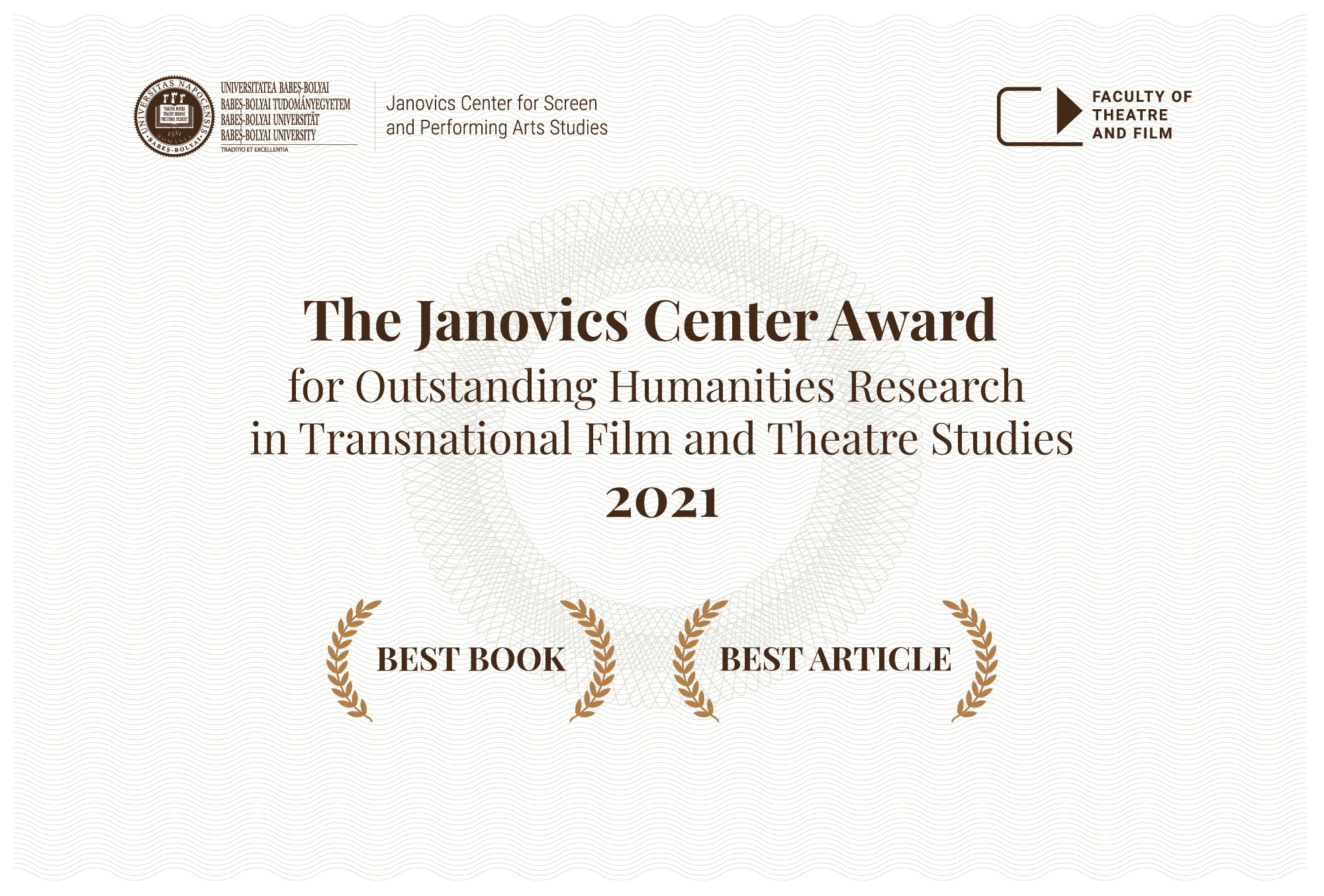
Award Winners Announcement,
The Janovics Center Award for Outstanding Humanities Research in Transnational Film and Theatre Studies is yearly awarded to publications that advance transnational research in the fields of film and theatre studies and employ innovative methods in the humanities. The Jury awarding these works was composed of Professors Michael Gott, University of Cincinnati, Mariana Liz, University of Lisbon, and Constantin Parvulescu, Babes-Bolyai University (for film studies), and Liviu Dospinescu, Laval University Quebec, Péter P. Müller University of Pécs, and Miruna Runcan, Babes-Bolyai University (for theatre studies), decided to offer the following awards:
This year’s BEST BOOK award (monograph or collection) was offered to Rachel S. Harris and Dan Chyutin (eds), Casting a Giant Shadow: The Transnational Shaping of Israeli Cinema, Indiana University Press, 2021. The Jury commended the collection’s innovative, transnational approach to the study of a national cinema, the overall quality of its chapters and introduction, its comprehensive design, and the relevance of its intervention in the historiography of Israeli cinema.
This year’s BEST ARTICLE award was offered to Andrew Higson, “The Resilience of Popular National Cinemas in Europe (part one and two), Transnational Screens, 12:3, 2021, 199-219, 220-232. The Jury appreciated the extent, thoroughness, and relevance of the presented research, its interdisciplinary approach, and the way the work tackles major concepts in contemporary film studies, delivers a convincing defense of the concept of national cinema, and presents its findings in a clear and persuasive prose.
The Jury decided to offer a SPECIAL MENTION to Andrea Virginás, Film Genres in Hungarian and Romanian Cinema: History, Theory, and Reception, Lexington Books. 2021. The Jury recognized the ambitious objectives of the monograph, its contribution to understanding genre history, its comparative transnational method, and its insightful understanding of the cultural and industrial dynamics of small European film cultures.
The Janovics Center congratulates the authors for their achievements and will organize book presentations and talks related to their work. Further details on the award and related events are available on the Center’s website, under News and Events.
Cluj-Napoca, March 21, 2022.
Constantin Parvulescu and Miruna Runcan
Event – The Unknown History and Mystery of Bambi: How Walt Disney Perverted History a talk by Jack Zipes
Wednesday, March, 23, 5pm (Bucharest time)
Join Zoom Meeting
https://zoom.us/j/96839292196?pwd=VHdjaXNPZ0doZjF2WEdZRTZjWlRmUT09
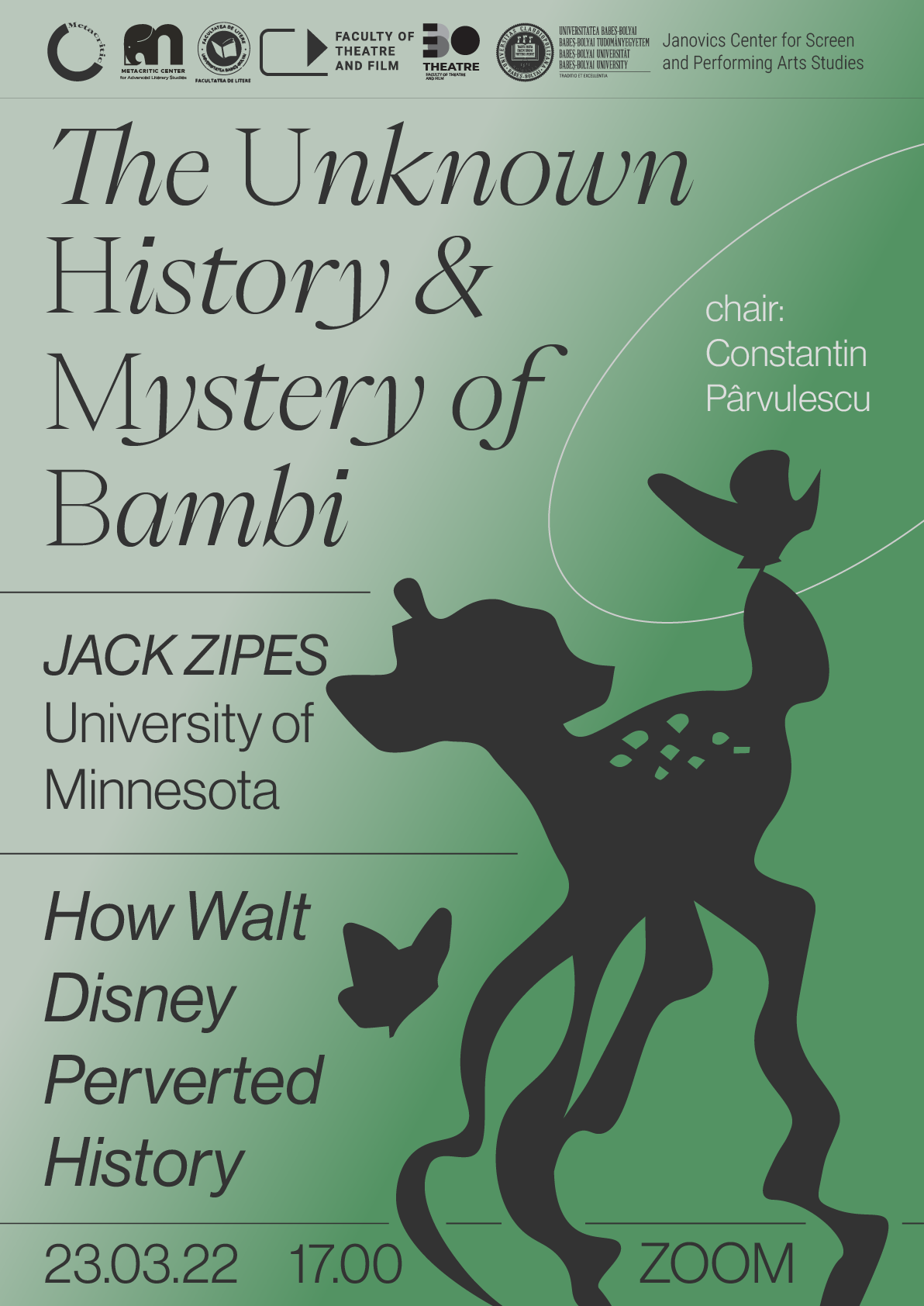
Event – How feminism is seen on the Romanian stage
An invitation to online debate
Friday / January 25th / 2022 / 6 PM
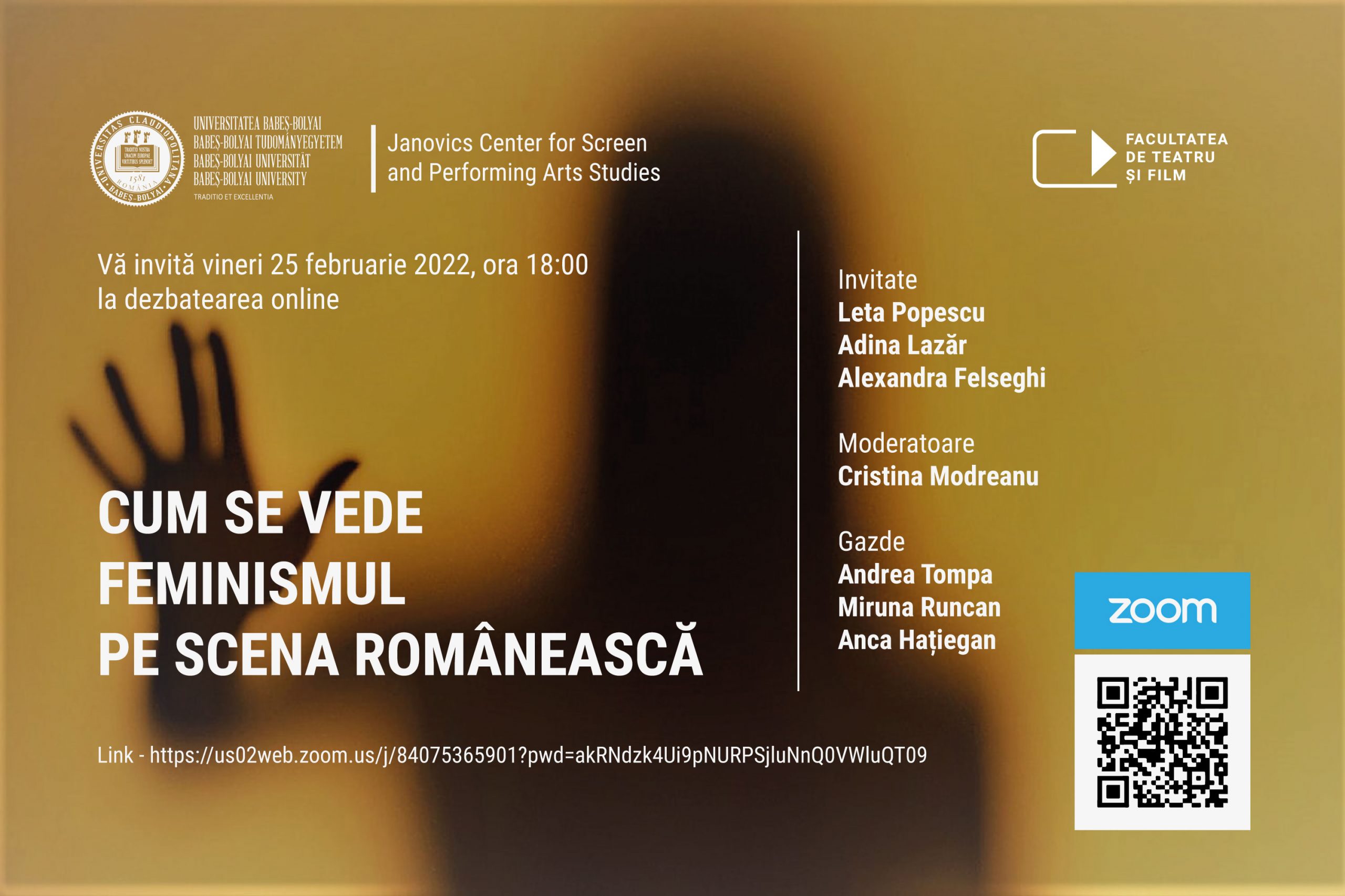
Despite the overwhelming challenges caused by the pandemic, the latest theatrical seasons have witnessed the coagulation of themes and artistic products related to the condition of women in today’s Romania. How deeply are they explored and what is the effect? We invite you to take part in an open and unbiased debate on this matter.
Guests: Leta Popescu, Adina Lazăr, Alexandra Felseghi
Moderator: Cristina Modreanu
Hosts: Andrea Tompa, Miruna Runcan, Anca Hațiegan
Location: ONLINE / ACCESS LINK
News – Jury: The Janovics Center Award for Outstanding Humanities Research in Transnational Film and Theatre Studies announces the jury for its film studies section:
News – Call for Submissions: The Janovics Center Award for Outstanding Humanities Research in Transnational Film and Theatre Studies
We invite submissions for our annual award for outstanding humanities research in transnational film and theatre studies. The award will be offered to contributions in the fields of film or theatre studies, books and articles.
The deadline for submissions is February 15, 2022.
News – Janovics Center for Screen and Performing Arts Studies has joined the Hungarian Theater Department, Babeș-Bolyai University in organizing the conference
The Invisible History as Her Story. Women in Hungarian/Minority Theater.
The conference takes place from 2nd to 4th of December in a hybrid format and it is supported by the Hungarian Academy of Sciences, the Hungarian University Institute of Cluj and the Babeș-Bolyai University.
The conference is bilingual, English and Hungarian, and interpreters will be provided for all presentations.
The Key Speakers are Gajdó Tamás (Hungarian Theater Museum and Institute), Penny Farfan (University of Calgary, Canada), Alina Nelega (University of Arts, Tirgu-Mures), Pető Andrea (Central European University, Hungary-Austria).
Four of the authors presenting papers in the conference are members of Janovics Center for Screen and Performing Arts Studies: Miruna Runcan, Andrea Tompa, Anca Hațiegan, Cristina Modreanu.
See the detailed program of the conference at the event link: https://www.facebook.com/events/185449997071495
Event – Exploring East-Central European Screen Industries in Global Contexts with Petr Szczepanik
The Janovics Center for Screen and Performing Arts Studies organises a series of book talks with relevant authors from the industry. Audience is kindly invited on the 18th of November to meet Petr Szczepanik, author of Screen Industries in East-Central Europe.
This book provides an alternative perspective into the audiovisual and media industries of eastern and central Europe, namely the Czech Republic, Poland and Hungary. In doing so, it offers insight into the ways the screen industries of small nations are positioned in and respond to globalization and digitalization. Petr Szczepanik suggests that for these ‘digital peripheries’, globalization and digitalization are as yet incomplete, stumbling processes, closely intertwined with and mediated by deeply local circumstances and players.
Instead of a top-down economic or political overview, this book places central focus on the lived realities of producers as key initiators, facilitators, and cultural intermediaries. Drawing on in-depth interviews, it looks closely at how their agency is circumscribed by the limited scale and peripheral positioning of the markets in which they operate, and how they struggle to come to terms with these constraints through their business strategies, creative thinking and professional self-perceptions.
Moderated by professor Claudiu Turcuș, the talk titled Exploring East-Central European Screen Industries in Global Context, will be held online at 4.00 pm on 18th of November on zoom link: https://zoom.us/j/97017691384?pwd=NUplMUcvdm92dWl5bFVGb2tCTHlwZz09
The book is available as open access through the Bloomsbury Open programme and can be downloaded from www.bloomsburycollections.com.
Event – The Janovics Center for Screen and Performing Arts invites young and senior researchers, academics, and students to the debate-seminar
Event – ROUNDTABLE DISCUSSION WITH THE ARTIST ORLAN
Guests:
· Horea Avram – Critic de artă, curator, Conferențiar Universitar la Facultatea de Teatru și Film a Universității Babeș-Bolyai, Cluj-Napoca (moderator)
· Ioana Costaș – Directoarea delegată a Institutului Francez din România la Cluj-Napoca
· Bogdan Ghiu – Scriitor, eseist, traducător
· Laura T. Ilea – Scriitoare, eseistă, Lector universitar la Facultatea de Litere a Universității Babeș-Bolyai, Cluj-Napoca
· Călin Stegerean – Eseist, artist, Directorul General al Muzeului Național de Artă al României
· Florin Ștefan – Artist, Profesor la Universitatea de Artă și Design Cluj, Președintele Federației Centru de Interes
· Yann Toma – Artist și cercetător, Profesor de arte vizuale la Universitatea Sorbona din Paris
Event – Seminar hosted by Janovics Center for Screen and Performing Arts Studies
LOCATING THE WOMEN IN EARLY ROMANIAN CINEMA: MARIOARA VOICULESCU AND LOST FILM HISTORIES
The seminar will be held online via Zoom, and followed by a Q&A.
Join Zoom Meeting
https://zoom.us/j/3159042949?pwd=bHczd3pQNmIxUVcyQmFIb1paUi9aUT09
Meeting ID: 315 904 2949
Passcode: T8Kja9
News – Ana Grgic and Constantin Parvulescu will serve on the official selection juries of ASTRA International Documentary Film Festival Sibiu, September 5-12, 2021 https://www.astrafilm.ro/en/jury-2021
News – In May 2021 Romanian Association for Performing Arts (ARPAS) received the AFCN Award for ”Reviving the Immaterial Heritage” for the project The Multimedia Dictionary of Romanian Theatre- DMTR.ro, project leader Cristina Modreanu.
News – Professor Miruna Runcan was awarded the prestigious Best Critic Award at UNITER’s Gala in July 2021.
News – Professor Miruna Runcan was nominated for the “Literary Criticism/Literary History/Literary Theory Award” by Observator Cultural 2021 for her book Teatru în diorame. Discursul criticii de teatru în comunism. Amăgitoarea primăvară 1965-1977, (Theatre Criticism Discourses in Communist Era – 1965-1977), Tracus Arte, 2020.
News – Ana Grgić was awarded the New Europe College International Fellowship for the research project “Rediscovering a lost female film pioneer: Mărioara Voiculescu and early cinema in Romania and the Balkans” starting October 2021.
News – Cristina Modreanu will join the Theatre Department of UBB as an affiliate researcher starting October 2021.
Event – Romanian Theatre Heritage: A Dictionary for the next generations
We are excited to announce that The Multimedia Dictionary of Romanian Theatre -DMTR.ro will be presented in the frame of the National Theatre Festival in October 2021 on the occasion of the uploading of the 100th dictionary entry.
The occasion will be marked by introductions made by three of the researchers who have been actively involved with the construction of the Multimedia Dictionary, the project leader, Dr. Cristina Modreanu (researcher, UBB), the senior researcher and students coordinator Dr. Miruna Runcan (professor, Theatre Department, UBB) and theatre critic and producer Oana Cristea Grigorescu.
We will keep you updated on the exact day and hour and you are invited to join us on the celebration of this event..





